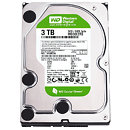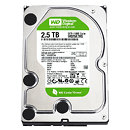Tuesday, October 19th 2010

Western Digital Announces Caviar Green 2.5 TB and 3 TB SATA Hard Drive
WD today announced that the company is shipping the world's largest capacity SATA hard drive. As the latest addition to its WD Caviar Green family of SATA hard drives, the new hard drives deliver up to a massive 3 terabytes (TB) of storage capacity on a single drive. WD is leading the industry in capacity for SATA hard drives by utilizing 750 GB-per-platter areal density and Advanced Format (AF) technology.
WD Caviar Green drives are an eco-friendly storage solution with WD GreenPower Technology, which reduces power consumption by enabling lower operating temperatures for increased reliability and decreases acoustical noise for quiet operation. The WD Caviar Green 2.5 TB and 3 TB hard drives are designed for use as secondary external storage and next-generation PC storage in 64-bit based systems.Drives with capacities in excess of 2.19 TB currently present barriers for PC hardware, firmware and software. To satisfy the new set of requirements of which users must be aware to successfully integrate larger capacity drives, WD is bundling its WD Caviar Green 2.5 and 3 TB hard drives with an Advanced Host Controller Interface (AHCI)-compliant Host Bus Adapter (HBA), which will enable the operating system to use a known driver with correct support for large capacity drives. For more information on solving the 2.19 TB drive barrier, please see the WD information sheet here.
"WD remains a leader of hard drive capacity and low power innovation. With our WD Caviar Green drives, we enable energy-conscious customers to build systems with the highest capacities that deliver the optimal balance of system performance, ensured reliability and energy conservation," said Jim Morris, executive vice president and general manager of WD's client systems storage group. "Customers will be able to take advantage of this breakthrough capacity point now for secondary external storage in legacy 32-bit systems that run on Microsoft Vista or Windows 7 platforms."
Price and Availability
WD Caviar Green 2.5 TB hard drives (model number WD25EZRSDTL) and 3 TB hard drives (model number WD30EZRSDTL) are available now in the U.S. at select resellers and distributors. MSRP for the WD Caviar Green 2.5 TB hard drive is $189.00 USD and the 3 TB hard drive is $239.00 USD. WD Caviar Green hard drives are covered by a three-year limited warranty.
WD Caviar Green drives are an eco-friendly storage solution with WD GreenPower Technology, which reduces power consumption by enabling lower operating temperatures for increased reliability and decreases acoustical noise for quiet operation. The WD Caviar Green 2.5 TB and 3 TB hard drives are designed for use as secondary external storage and next-generation PC storage in 64-bit based systems.Drives with capacities in excess of 2.19 TB currently present barriers for PC hardware, firmware and software. To satisfy the new set of requirements of which users must be aware to successfully integrate larger capacity drives, WD is bundling its WD Caviar Green 2.5 and 3 TB hard drives with an Advanced Host Controller Interface (AHCI)-compliant Host Bus Adapter (HBA), which will enable the operating system to use a known driver with correct support for large capacity drives. For more information on solving the 2.19 TB drive barrier, please see the WD information sheet here.
"WD remains a leader of hard drive capacity and low power innovation. With our WD Caviar Green drives, we enable energy-conscious customers to build systems with the highest capacities that deliver the optimal balance of system performance, ensured reliability and energy conservation," said Jim Morris, executive vice president and general manager of WD's client systems storage group. "Customers will be able to take advantage of this breakthrough capacity point now for secondary external storage in legacy 32-bit systems that run on Microsoft Vista or Windows 7 platforms."
Price and Availability
WD Caviar Green 2.5 TB hard drives (model number WD25EZRSDTL) and 3 TB hard drives (model number WD30EZRSDTL) are available now in the U.S. at select resellers and distributors. MSRP for the WD Caviar Green 2.5 TB hard drive is $189.00 USD and the 3 TB hard drive is $239.00 USD. WD Caviar Green hard drives are covered by a three-year limited warranty.


40 Comments on Western Digital Announces Caviar Green 2.5 TB and 3 TB SATA Hard Drive
I do like WD, but also Seagate and the others who are still producing today. There is one exception -Samsung- who I haven't bought yet (but I have a couple 2TB drives in my cart right now).
My rough estimate counting personal and work systems that I oversaw in the last eight years, 2 bad drives in 900. Even had good luck with Deathstars. I had them in air-cooled bays, so the idea that it may have been a heat issue with them seems plausible. Don't know if an official reason was ever given by IBM or not. Not that it's important now.
EDIT: After reading Anand's review, he is suggesting the same thing:
I never had a prob. with my WD´s, but two of my four Samsungs F1 (1TB) died on me ... They are in the same enclosure as my Caviar Black 2TB´s.....
and when we are @ it .... I still have two 74 GB Raptors running, and they are 7 years old.....so I´ll stik with WD.....
From the legit reviews review
"The WD Caviar Green 2.5TB and 3TB drives have capacities in excess of 2.19 TB and this presents barriers for PC hardware, firmware and software. To get around these issues WD is bundling its WD Caviar Green 2.5 and 3 TB hard drives with an Advanced Host Controller Interface (AHCI)-compliant Host Bus Adapter (HBA), which will enable the operating system to use a known driver with correct support for large capacity drives."
In the review they used the drive as a secondairy and used the included pci-e to connect the drive to the test setup so i would assume the os is a major problem but have no clue if it could be used as a primary drive even with the included adaptor :confused: I have no idea, what about 2 2tb drives raided, does that not cause problems due to the os seeing it as a single 4tb drive? :confused:
I give up :laugh:
windows cant use partitions above 2TB except in 64 bit
BIOS cant boot from partitions (or is it drives?) that are greater than 2TB
* To use it (>2,2 TB) as a secondary drive without UEFI you need Vista/7 and the HBA controller.
* The disk must be partitioned with GPT to use more than 2,2 TB due to the limitations of MBR.
Gathered from WD and Wiki, please correct me if I'm wrong.